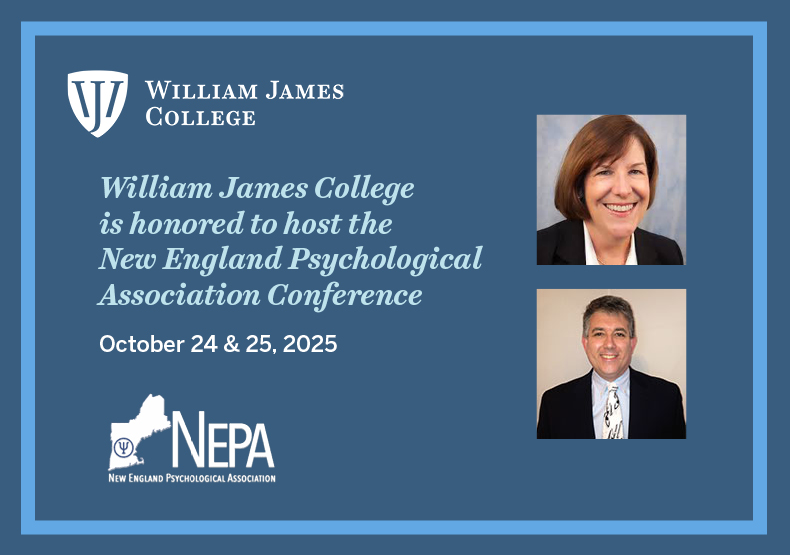William James College to Host 2025 New England Psychological Association Conference in October

A wealth of ideas and best practices are slated to converge upon One Wells Avenue in October when William James College hosts a pair of pivotal events among psychology enthusiasts. The New England Psychological Association (NEPA) and the Northeastern Conference for the Teaching of Psychology (NECTOP) will convene on campus for each organization’s annual conference—equally anticipated among experts in the field, practitioners in training, and teachers of psychology.
“Beyond it being a really inclusive, open conference that welcomes the joy of psychology, I enjoy the NEPA conference because it reaches undergrads and graduate students and professionals,” says Daniel B. Jacobs, PsyD, EdM, MBA, Associate Professor, School Psychology and Organizational Leadership Psychology Departments, who brings deep experience to the table: The eight-time NEPA presenter, whose expertise lies in cross-cultural issues surrounding substance abuse, has applied to present at both the NEPA and NECTOP conferences this year; he is awaiting word as to his status.
“The student-centered nature of NEPA gives these bright and capable undergraduates and graduate students—who have engaged in hands-on research with faculty, mentors, and peers—the opportunity to present their work publicly, often for the very first time,” says Beth Rogan, Director of Educational Partnerships, who is at the helm of organizing these events for the College.
ACCESSIBLE AND INCLUSIVE
Jacobs considers the NEPA Conference an accessible entry-level event for students to attend—one free from some of the challenges others can present. Traditionally held on a college campus in one of the six New England states, attendance requires neither airfare nor overnight accommodations—putting the full kaleidoscope of addresses, symposia, workshops, papers, and posters on psychological science research and teaching within reach of all.
“It’s not orthodox in one type of psychology, that’s the beauty of the NEPA Conference!” says Jacobs of wide-ranging poster presentations that include all of the psychologies—from clinical and counseling, to school and organizational—rather than focus on single silos as is often the case with many psychological conferences. Another benefit?
“Not everyone likes making public presentations, and this is a great chance for students to interact with a diverse range of people, promote the concepts they’ve been studying, and answer questions about their research in a room full of other people doing the very same thing,” says Jacobs emphasizing up to five sessions of poster presentations throughout the weekend.
NEPA’s focus on sharing information and making connections means attending this conference is fun for all.
“I enjoy meeting students from other schools who bring great questions while having the chance to showcase our programs to those pursuing graduate work,” says Jacobs, underscoring one he’s particularly passionate about: Addressing Substance Abuse in Schools. The two-credit elective, first offered in 2017, positioned Jacobs’ MA/CAGS level school psychology students among the very few nationwide currently receiving this training. After three years doing so on an ad hoc basis, the William James College administration has committed to fund the course so that, going forward, students in Jacobs’ program no longer have to pay for it.
ALL-HANDS-ON-DECK APPROACH
Preparing to host this event requires a team effort among folks from almost every academic department, as well as Marketing, IT and Facilities—a process in which Rogan and colleagues are well-versed, having done so once before in 2017.
“The folks who participate in putting the conference together—all of whom are volunteers—do so because they believe the work is important,” says Rogan, who currently sits on the NEPA Advisory Board and is a member of their Steering Committee. She and Jacobs point to NEPA Coordinator Michael Amico, Ph.D., as not only instrumental in facilitating the multi-faceted process but also being a pleasure to work with.
“Our building is getting spruced up, and we have a beautiful new deck under construction,” says Rogan who hosted Amico and the Steering Committee in early May. After witnessing how the space is taking shape, all were reminded of the host location’s central draw:
“That our campus is one building makes for an intimate, accessible, and inclusive event,” says Rogan who anticipates all hands on deck throughout the weekend. In addition to faculty and staff support, she anticipates 50 student volunteers doing everything from welcoming attendees and helping them find meeting spaces to providing IT and general support during presentations; if all goes according to plan, Rogan envisions creating a drop-in space to facilitate student-to-student conversation.
Rogan, whose tenure spans 15 years, remains in awe of what unfolds across campus every single day. “It’s such important, transformative work,” she adds, calling the chance to host this conference, “and represent the William James College mission through our students, our faculty, and our physical space,” a wonderful opportunity for the College and the community at large.
GET INVOLVED
Since its inception in 1963, NEPA has been mission driven to advance psychology as a science, profession, and means of promoting human welfare. Partnering with NECTOP, the organization is advancing educational standards in the field of psychology like never before.
Want in on the fun? NEPA 2025 is slated for Saturday, October 25; review of posters will continue until September 1. NECTOP 2025 will happen on Friday, October 24; posters will be accepted for review through August 15. Registration for both is currently live and accessible here.
“We want students to be aware of what programs are out there in the field—especially viewed through a lens of pursuing applied work with individuals—because there's such a need for clinicians,” says Rogan, sharing a sentiment with which Jacobs agrees:
“Amidst an ongoing shortage of folks pursuing careers in behavioral health, we really need the next generation to step up and let us train them.”
- Tags:
- Research & Advocacy
Topics/Tags
Follow William James College
Media Contact
- Katie O'Hare
- Senior Director of Marketing
- katie_ohare@williamjames.edu
- 617-564-9389
